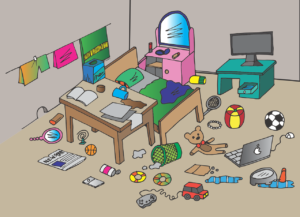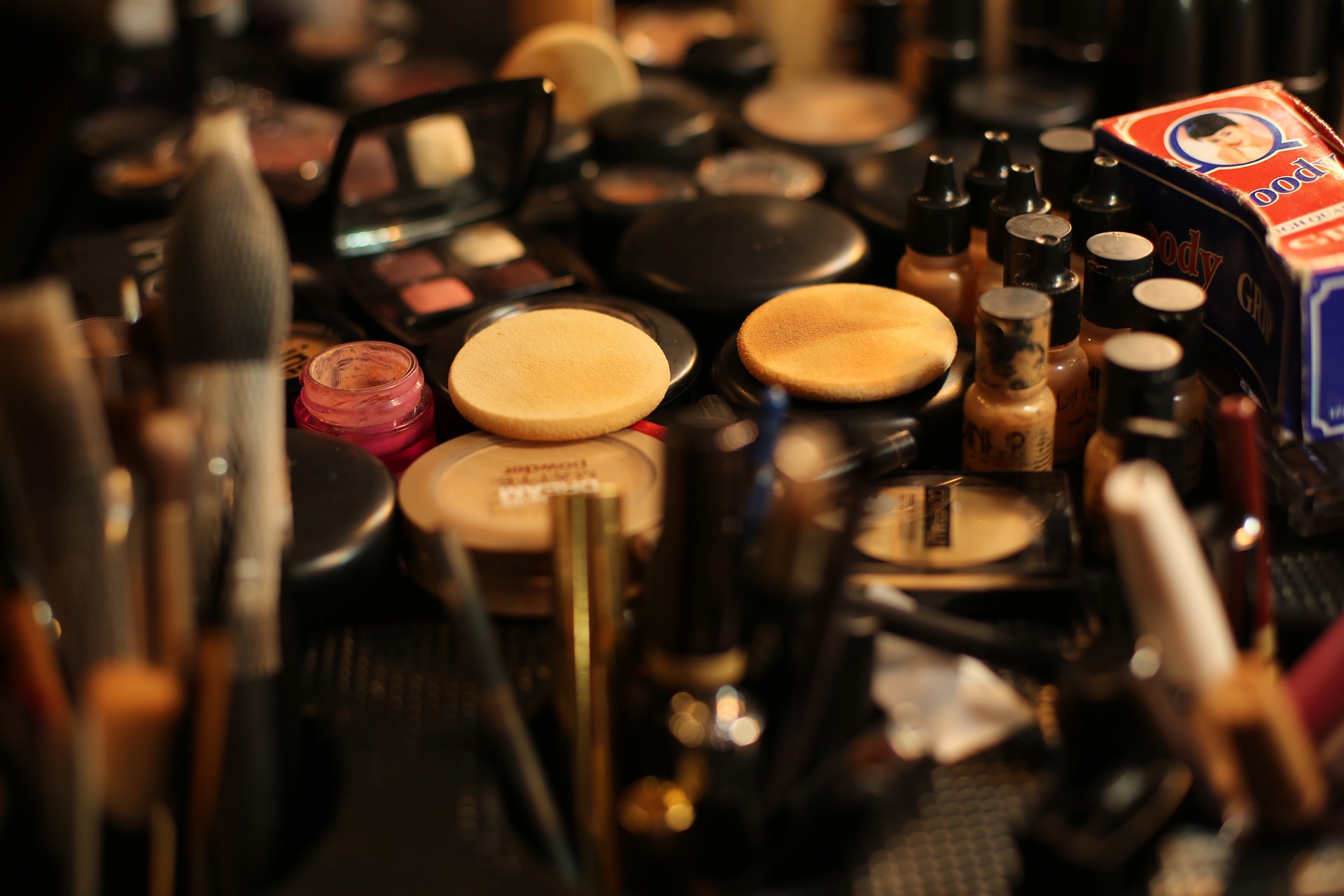A meditation on all the things i dont wanna do

As I was scrolling through Instagram a couple days ago (probably procrastinating on writing this article) I came across a Buzzfeed post from a few weeks ago, featuring a Tweet by @TheEssenceOf_. It confidently told me that if I ever felt like I was lazy or not doing enough, I should just remember the time I took off my makeup in the middle of the night and give myself some slack. I interpreted it as a supportive message telling makeup wearers all over the world to be proud of all the important and difficult things we do: like cleaning our faces before sleep (which can honestly take a solid ten minutes sometimes). What a big mood, I thought, as I shared the post with a couple of friends.
Here I am now, at 2 am, trying to write a piece I should have finished a week ago. After that very productive Instagram session, I opted to vegetate in my unmade bed and listen to my newest half-complete Spotify playlist instead of writing. For the rest of the week I did nothing except sit in various places and wait for all my pre-reading week deadlines to smack me in the forehead. I can’t even pretend I was doing anything more useful with my time!
Be proud of all the important and difficult things you do, like cleaning off your makeup before sleep.
Maybe that’s the problem — that we need to find an excuse to justify doing “nothing useful” speaks to the degree to which our lives have become dominated by the idea of work and progress. At some point, having a good work ethic turned into having a good life. Not long after, this type of “good life” turns into total burnout.
Anne Helen Petersen addresses this issue in her recent article for Buzzfeed News, “How Millennials Became The Burnout Generation.” Her main point is that the entire millennial generation suffers from a chronic burnout which makes mundane tasks seem nearly insurmountable. That argument is hard to refute, even if we widen the millennial category to include current students born at the end of the 90s and the early 2000s. Just consider that people actually need to tell us that successfully cleaning our faces means we’re doing okay. Ask yourself how many of your friends actually make their beds every morning, wash all their dishes everyday, or do their laundry before they totally run out of clothes to wear out. Walk into the ICSS office and try to count how much unclaimed reimbursement money is contained in all the ancient unclaimed cheques (much respect if you’re that good at mental math). Petersen blames this inability to bring ourselves to complete daily tasks and errands like cleaning and picking up cheques on our upbringings. She argues that we have been conditioned to be continuously productive and aggressively self-improving since childhood. To her, this is a fate which is so draining on our mental energies that, as young adults, we simply cannot function fully anymore.
Perhaps Petersen is right. When I was a tiny kid, I wanted to be a breakout star like Roxie in Chicago or the girl in ABBA’s Dancing Queen. Everyone told me neither of those were real jobs (would they call Billie Eilish unemployed, then?). When I got a little older, I dreamed of being a journalist or a writer like Ernest Hemmingway, sitting for hours straight drinking coffee and alcohol I’d never heard of before from little Parisian cafes. Now that I think about it, drinking that much cognac really can’t be healthy… but that’s not the reason I changed my dream. I ultimately decided to go to university for social science because I couldn’t stand the thought of going into STEM (just because I felt like that’s what society expected my Asian-Canadian self to do), and I think something vaguely resembling “Political Science” has a slightly better chance of landing me a stable career than the whims of Broadway or Gertrude Stein’s ghost. Even so, not a day goes by without somebody suggesting to me that I’ll be living in my parents’ basement for the rest of my life with a BA that will have cost me several years of my time and thousands in student debt. Heck, I even tell myself that.
In other words, if I don’t make a big splash with either my grades, my extracurricular involvement, or my networking skills, I won’t make it at all.
No wonder parents are opting to push their kids down increasingly intense paths: drilling them in reading and math starting in elementary school, driving them to dance lessons or hockey practice or tutoring (or improv class!), spending small fortunes on AP and IB and whatever other ‘elite’ acronyms they can find — anything to push their kids to be the best of the best and thus first in line for that fading dream called a good career.
Meanwhile, these children are being told that they have to work hard if they want bright futures. They’re being told that if they slack off, that dream can only slip further from them, that if they don’t pick their paths wisely, they may end up with no prospects. Then there’s my parents, arts majors themselves, who endorse my decisions but warn me that social science is all or nothing. In other words, if I don’t make a big splash with either my grades, my extracurricular involvement, or my networking skills, I won’t make it at all.
But is this really the only reason for burnout? Personally, I don’t buy it. Of course, it’s part of it. The economic shift to increasingly precarious employment is scary and makes it easy to internalize the constant pressures to gain a competitive edge over the next person. Petersen argues that life in the past was easier, however — somehow more relaxed, less breakneck. I think she’s slipping into dangerous territory here by sweeping history into an idealized and generalized past. I can’t speak for other people, but my own parents certainly didn’t have it easy — they came from the second most populous country in the world with an immense cultural emphasis on education. They are no strangers to intense stress and competition as students. My grandparents — all of them various kinds of educated people, bankers, and scholars — had to deal with the arrival of the Communists, the Cultural Revolution, and a famine during their lives. They had it even harder, yet they and their generation don’t seem to share the same sort of crippling relationship with chronic burnout.
our entire generation has forgotten how to power off
So why? Why us?
My parents suggested that maybe my generation is just not as disciplined. They don’t mean it a bad way, but rather say that life is so much better for us with all our new technologies and conveniences that we can’t deal with suffering through things we don’t either enjoy or need to do to survive. If that were so, though, why would we break into literal and/or metaphorical cold sweats every time we’re faced with filing paperwork or doing the dishes after we eat?
I think a lot of it comes down to the fact that our entire generation has forgotten how to power off. While many of our parents had intense pressure put upon them, they were able to escape it all by simply leaving their physical place of work: by going home. For so many of us, that’s just not possible. What place of work are we supposed to leave, if we do all our work on the mobile devices we carry everywhere on our persons? And even if we were to leave those pieces of hardware behind, what of the internet? That amorphous space that exists in some digital dimension we can’t even see is not escapable. Even if we aren’t checking our emails or the number of likes on our latest Instagram post right at this moment, we’re constantly inundated with information about other people’s “successes.” We hear talk about so-and-so’s Instagram live from Google’s offices, or about how our classmate worked on that one essay for a solid week non-stop. There’s a constant pressure to measure up — to compete against other people small successes and avoid their large failures. There’s a constant reminder that we’re on the edge of failing, that we must be exceptional, and that we need to constantly be better and never clock out.
The New York Times recently published a great piece on the pervasive culture epitomized by the punchline “love your work and you won’t work a day.” They argue that now, especially in tech and innovation, this toxic and controlling attitude that one should live to go to work in the morning and loath going home is increasingly internalized by young workers. All over social media I see articles with titles like “Make 2019 The Year You Finally Fall In Love With Your Career” circulating and getting attention. If we do what we love as children, we won’t ever find “success” as adults. Instead, we’re told that we should love those careers which have been linked with this notion of success and happiness. And once we find ourselves on this career path — or perhaps to achieve it in the first place — we must never give ourselves a break.
No wonder we have trouble getting small tasks done. No wonder we’re always tired and drained. No wonder we’re so burned out. So maybe instead of sharing posts that tell us that we aren’t lazy because we took off our lipstick last night, we turn to each other and wholeheartedly embrace doing absolutely nothing every now and then.
